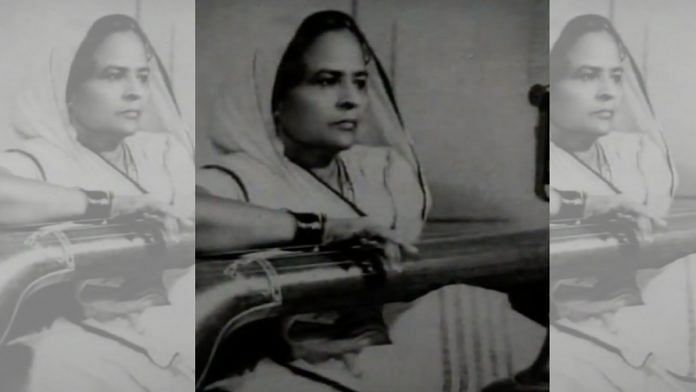New Delhi: In her 2009 documentary ‘The Other Song’, filmmaker Saba Dewan discovered a lost thumri by singer Rasoolan Bai — ‘Lagat jobanwa ma chot, phool gendwa na maar’ (My breasts are wounded, don’t throw flowers at me). According to Dewan, in all probability the thumri was never performed by Rasoolan again because of the erotic undertones to it and as a result, it was lost to oblivion, like much else in her life.
A discussion about thumri, a prominent part of the Hindustani classical music tradition, is incomplete without mentioning Rasoolan Bai. One of the few female singers who performed thumri on Air India Radio (AIR), her rendition of songs, be it thumri or other classical vocal forms like dadra, tappa or regional folk songs were unparalleled.
A fact that the legendary singer herself emphasised in a rare interview with Doordarshan. “Only those with a good soul, musically inclined and a melodious voice can sing thumri, not everyone can,” she said.
On her 46th death anniversary on 15 December, ThePrint remembers the forgotten tale of thumri exponent Rasoolan Bai.
Also read: Rokeya Sakhawat Hossain — a pioneer of women’s education who strove for a feminist utopia
‘Bol bano’ style
While Rasoolan Bai’s position in the musical tradition of thumri is undisputed, there is little known about her early life.
Born in 1902 at Kachhwa Baazar in Mirzapur, Uttar Pradesh, Rasoolan started learning music from the age of five. She first learnt tappa — another form of Indian classical vocal music — before moving on to thumri. Along with her contemporary, Siddheshvari Devi, Rasoolan became one of the foremost performers of the Benaras style of thumri.
Projesh Banerjee’s book ‘Dance in Thumri’ talks about how her style of singing belonged to the ‘Purab Ang Tappa ki Thumri’ of Benaras.
According to ethnomusicologist Peter Manuel, Rasoolan’s recordings of thumri and dadra are also the earliest known recordings of pure ‘bol banao’ style.
‘Bol bano’ emphasised the musical expression of words, even though the melodic range is limited in this style. Rasoolan’s many recordings in Bhairavi also show little melodic range but her emotive voice found its place within the limitations offered by the style.
Her popularity stemmed from her songs on unrequited love and she was also awarded the Sangeet Natak Akademi award in 1957.
An interesting anecdote about Rasoolan is that she was one of the first singers to start covering one ear to attain perfect pitch — a practice that has become universal now among singers.
Also read: ‘Tum mujhe yun bhula na paaoge’ — remembering Mohammad Rafi 40 years after his death
Courtesan-culture, thumri and Rasoolan Bai
Thumri as a vocal classical genre emerged in North Indian courts in the nineteenth and twentieth century and were performed by courtesans or tawaifs. Rasoolan, who inherited her musical legacy from her mother Adalat Bai, was one of the last purveyors of this rich cultural tradition, being a former courtesan herself.
Vidya Rao, Hindustani classical singer and writer, describes thumri as being “all about emotion, and the predominant of course being love and longing. There is a distinct note of tenderness in the songs. Thumri was a space women, and in particular courtesans, occupied within the larger domain of classical music”.
Thumri is said to have originated from parts of eastern Uttar Pradesh and Bihar as a form of music associated with Lord Krishna’s raas leela. There were distinct erotic undertones and expressions of female sexuality were a prominent theme in this form.
However, post-Independence, thumri as a genre found itself ousted from ‘high’ classical music since it was mostly performed by courtesans. A cultural sanitisation of sorts followed, which included the shutting down of kothas in 1947.
According to Rao, in the early years after Independence, All India Radio stopped traditional thumri singers from recording. Women had to produce marriage certificates to prove they were respectable. One of the reasons Rasoolan’s renditions are still available is that she was able to provide this certificate and record for AIR.
Partition and demise
Rasoolan gave up mujra or court performances in 1948 and got married to a Banarasi silk saree dealer named Sulemain, and also had a son named Wazir.
However, both her husband and son eventually relocated to Pakistan for unknown reasons while Rasoolan went to Ahmedabad.
In September 1969, during the Hindu-Muslim riots that broke out in Gujarat, her house was burnt down in the ensuing violence.
Such was the popularity of Rasoolan Bai and her thumris, that prominent poet Agha Shahid Ali in ‘Thumri for Rasoolan Bai’ lamented the loss of the singer’s house to the violence:
“I could only preserve/her breaking voice/while the house was burned its bhairavi”
Rasoolan lived in Ahmedabad until her death on 15 December 1974 at the age of 72. She died in penury.
Also read: Meena Kumari, tragedy queen on screen and accomplished poet off it



